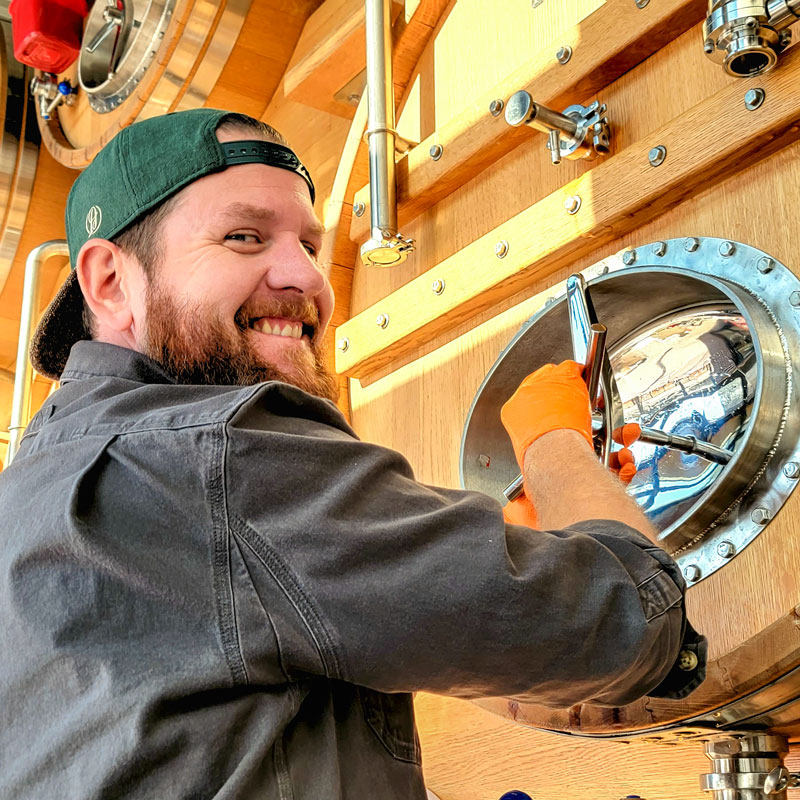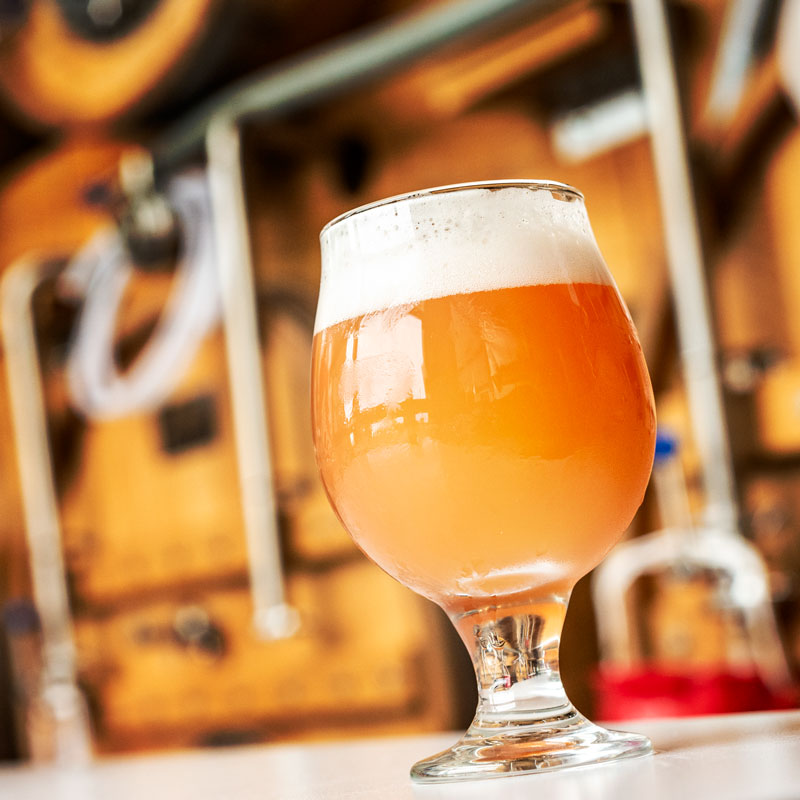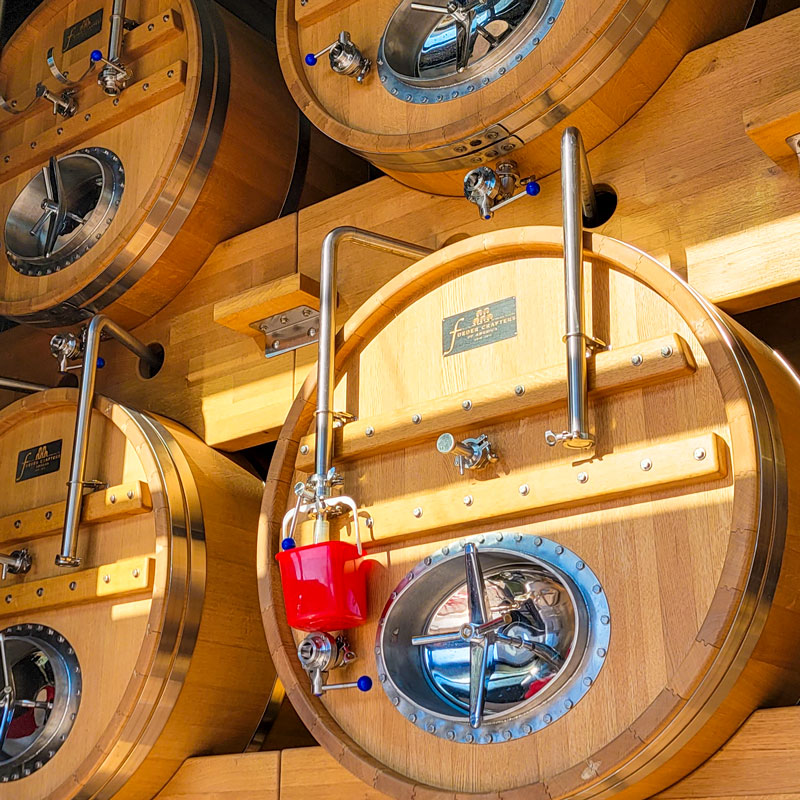FAQ’s
What is the Solera method?
The solera method of souring beer involves consistently refilling aging vessels (in our case, oak foeders) with new beer, which then mixes with remnants of the previous batch. This allows for each subsequent beer to add aspects of the ones before it, adding increasing layers of complexity ad infinitum.
What is a foeder?
A foeder is a large wooden vessel (essentially an oversized barrel) used for aging beer. The porous nature of the wood allows for the absorption of prior liquids (e.g. whiskey) as well as bacteria that can lend added complexity to future beers stored therein.
What is a sour beer?
Sour beers are the result of intentionally allowing bacteria and wild yeast into the brew through a barrel (what we do) or a coolship (an open vat). This adds different levels of sourness, tartness and/or acidity. The most common types of microbes in sour beers are the bacteria Lactobacillus and Pediococcus, and the fungus Brettanomyces.
How long does it take to make a sour beer?
We won’t know until it’s ready! Sour beers evolve over time to emphasize different balances of flavor and sour characteristics. It requires frequent testing over months, even years, to know when it’s time to package.
Why is it important to keep sour beer production separate from normal beer?
The tiny microbes in sour beers can and pretty much will infect your brewhouse and thus your brews. This can potentially add unintentional sourness and/or tartness to your normal beers that shouldn’t have it. It is incredibly difficult eradicate them completely and so should be avoided at all costs.
The more things change, the more things stay the same…
This old proverb is what I think about most when it comes to beer. In a short amount of time, I have witnessed beer go places I never thought it would. Yet despite the popularity of “kitchen-sink” styles of beer in this modern landscape, I have also seen a shift away from them to more nuanced, refined, and traditional ones.
First, a little history. Beer was discovered around 9000 years ago but hops in beer have only been in use for about 500 years, originally being used for their antimicrobial properties. Before then, most beer had some form of sourness and tartness to them because there was no way to keep local bacteria and wild yeasts from doing what they do best — synthesizing proteins and sugars to make alcohol and flavor compounds. Additionally, wooden vessels were used for fermentation because modern food-safe materials such as stainless steel were not invented until 1913. While wood is extremely versatile, it is also very porous, which led to bacteria proliferating in all the nooks and crannies of traditional beers. Eventually, modern science capitalized on the benefits of hops, isolated clean yeast strains, and new equipment to standardize beer into what we know today.
Alter is far from the first brewery to dive into sour beers. Since the 90’s, the godfathers of the craft brewing industry had been toying with them – bringing a renewed interest to the tradition. That said, souring remains quite the rare bird. This is because souring beer in the same facility as your clean beers is a recipe for disaster. In the event sour bacteria gets hold of your prized hazy IPA or crisp lager, all hell breaks loose. It may not be hyperbole to say you may as well burn the brewery to the ground and start over. It’s sort of like finding a black widow spider in your bed. Best to just move. In 2019, I decided to try and safely make some sour beers in our production facility. I quickly both fell in love and became terrified of the process. I can remember two specific times where I was one turn of a valve away from trying to package it only to stop and put everything back.
What then is the solution? Build an entirely separate facility to sour beer! Enter Alter Brewing + Kitchen in Oak Brook, a beautiful facility where we can stretch our imaginations and reach back into the beautiful history of what beer once was. We have no brewhouse in Oak Brook, so we cannot create wort – the liquified malt from which all beer is derived. Instead, we will make the wort in Downers Grove and transport it to Oak Brook where it will be fermented in our 20-barrel stainless steel fermenter. Once finished, we can transfer it to any one of our 12 oak foeders. A foeder is a wooden vessel that beer is aged in for various implementations, and due to its porous nature makes an excellent incubator for all sorts of mixed bacteria and cultures to create a wide range of flavors and aromas. Anything you can find on a farm or forest is fair game to enter the realm of our souring facility. We can use whatever unique, exotic, and fantastical ingredients we can imagine.
Souring beer in this way is certainly more of an art than a science. I always think of it as a palette of flavors that you can blend to create something new and wonderful, much like Bob Ross does when stroking a brush to canvas. Oak Brook could be called a Culture Canvas if you will. Much like a cast-iron skillet that never gets washed, the foeders will be constantly refilled while leaving remnants of the beer that once resided there behind, elevating its complexity over time. This means that even 20 years from now, any sour beers that come out of Oak Brook can be traced back to the original strains. This is what is referred to as the solera method.
This incredible process can take quite a bit of time. Some sour and funky beers can be ready within months of inoculation, while others take several years. When it’s ready just depends on what we want, what we taste, and where our imaginations take us. So here we are, 9000 years later, and while things have certainly changed, beer is in many ways the same as it ever was.
Matt McCowan
Head Brewer



